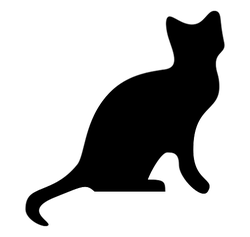Numerical CAT
 Let
be a three digit number with
being the hundreds digit,
being the tens digit and
being the ones digit.
Let
be a three digit number with
being the hundreds digit,
being the tens digit and
being the ones digit.
.
Given that is even, what is the value of ?
Image Credit: Wikimedia Cat silhouette
The answer is 144.
This section requires Javascript.
You are seeing this because something didn't load right. We suggest you, (a) try
refreshing the page, (b) enabling javascript if it is disabled on your browser and,
finally, (c)
loading the
non-javascript version of this page
. We're sorry about the hassle.
First we have to acknowledge that none of C nor A nor T can neither be 0 nor 5. Since we're told that T is even, any factor of 5 between C or A will make T a 0 and that effectively rendered each of C, A & T to also become 0.
100C + 10A + T
= (C + A + T)CAT
= (99C + 9A) + (C + A + T)
9(11C + A) = (C + A + T)(CAT - 1)
LHS has a factor of 9, so RHS must have the same.
Either CAT = 1 mod 9, or
C + A + T = 0 mod 9, or
both {CAT = 1 mod 3 & (C + A + T) = 0 mod 3}
Considering T is even, then we know that
CAT = {10, 28, 46, 64, 82}
Reject both 46 and 82 for the two having prime factors > 7. We're left with candidates of 100C + 10A + T among {152, 512, 272, 722, 174, 714, 444, 248, 284, 428, 482, 824, 842, 188, 818}.
The first permutation has a sum of 1+2+5 = 8 with no multiplier effect from (10-1)/9, too low to match up to LHS's 11C + A. The second one has a sum of 2+2+7 = 11, but even with multiplier of 3, it can't match up to LHS when we know we cannot have A = 0. The third has a sum of 1+4+7 = 12 with multiplier 3, but 11C + A ≠ 36 without any 3 for C (4 is too high and 1 too low). The fourth has a sum of 4+4+4 = 12 with multiplier 7, but 11C + A ≠ 84 without any 7 for C (4 is just too low). The fifth has a sum of 2+4+8 = 14 with multiplier 7, but 11C + A ≠ 98 since 11x8 would need an extra 10 to reach 98, but our A is a one digit number less than 10. The sixth and last one has a sum of 1+8+8 = 17 with multiplier also 7, but 11C + A ≠ 119 since C would have to be a two digit number of 10 to match up the RHS's value.
Now that we have exhausted all and any possibility of CAT = 1 mod 9, we'll move on to C + A + T = 0 mod 9.
Then C + A + T = 9 or 18 (but not 27 for the mention of T's evenness).
Our list would look like this :
Permutations of {(1,2,6) , (1,4,4) , (2,3,4) , (1,8,9) , (2,7,9) , (2,8,8) , (3,6,9) , (3,7,8) , (4,6,8) , (4,7,7) , (6,6,6)}.
For the first, they multiply into 12, and subtracting 1 from it, LHS's 11C + A cannot match an 11 without A = 0, a contradiction to our first paragraph. But the second turns out nicely, 1x4x4 -1 = 15 for RHS, and RHS = 11x1+4 = 15. Trying it out,
1x4x4x(1+4+4) = 16x9 = 144.
Yay, finally the answer of
100C + 10A + T = 144